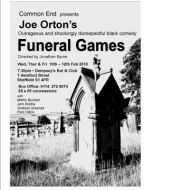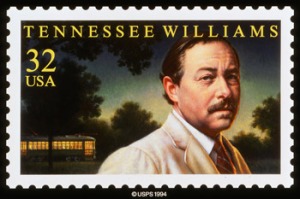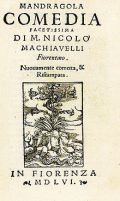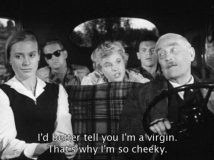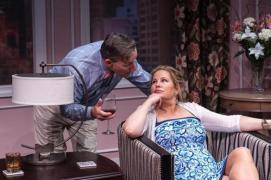 I hate this play. I hate this play. God, how I hate this play.
I hate this play. I hate this play. God, how I hate this play.
This is a wretched polemic of a play about how, hey, maybe we should be less critical of evangelical Christians because actually some of them are very educated and reasonable. Fine. That is true, and I believe that. But, okay, for one, I don’t think that is an adequate or adequately non-preachy conflict for an entire play, and for two, I don’t think that point need be made by creating on the one hand a young sunny couple comprised harmoniously of a non-religious young woman and a smart and reasonable young man with a Ph.D. in religion (The phrase “unequally yoked” never comes up somehow. If you don’t know what this phrase means, you’ve never hung with evangelicals.) – and on the other, an ignorant, sorta racist, rich, drunk, dreadful, flirtatious, motor-mouthed harpy of a mother who just can’t understand how her beloved daughter has been seduced by the religious right. Yes, the secular left has often made a straw man of religion. Absolutely true. That does not excuse using art as an excuse to set up a straw man of the secular left and then knock it down in the most self-satisfied way imaginable.
The following exchange actually takes place in this play:
Kate: I know I’m terrible but all I can think of is that awful Tammy Faye Bakker with her horrible clown make up and that raving Jerry Falwell who said that our sin caused 9/11!
Kitty: Mother, they’re dead, where have you been? That’s ancient history. Think Rick Warren, get with it!
Huntley (yes, the father’s name is really Huntley): But Kitty, Bakker and Falwell were very influential when they were alive, wouldn’t you say, Paul?
Paul: Yes, absolutely, but they were fundamentalists, not evangelicals. Fundamentalists are a subset of evangelicals, they read the Bible literally, we see metaphor and poetry.
Kitty: Thirty-five percent of Americans — possibly more — consider themselves evangelical Christians Mother [sic].
Putting aside the “tell, don’t show” nature of this and MANY MANY other exchanges and the horribleness of the name Huntley, let me just go on, as an ex-evangelical of the non-fundamentalist variety, to point out some logic and other problems. To start, basic syntax will show us that if “fundamentalists are a subset of evangelicals,” then the statement “they were fundamentalists, not evangelicals” is false. It’s true syntactically and it’s true in reality. Jerry Falwell was a VERY influential fundamentalist who is ALSO an evangelical and whose influence has clearly outlived his death in ways that showed up in the news TODAY – and you know what? He only died in 2007, six years before the premiere of Saving Kitty.
Second, Rick Warren’s beliefs are not particularly awesome or enlightened. He’s kinda anti-science, he’s anti gay marriage and has publicly equated gay relationships with incest and pedophilia, and he believes in abstinence-only education despite the abysmal record of such programs in actually protecting youth from sex or pregnancy. So there’s that.
Finally, while evangelicals do see metaphor and poetry in the Bible as any non-insane reader of the Bible would, many of them – I dare say most, I dare say nearly all evangelicals – believe in reading many portions of the Bible quite literally. That’s how they come up with most of their beliefs, both crazy and non-crazy
BUT NONE OF THAT IS THE POINT. All of that is my personal soapbox, but none of it at all is at all the point. The point is, this play is terribly written, and the idea that out of all the truly excellent dramas by women in this country – so hard to find, which is why I ended up buying Saving Kitty at a B&N, because it was the ONLY PLAY BY A WOMAN THEY HAD THAT I HAD NOT READ – this is the one chosen to go forward, to be staged and published and starred in by Jennifer Coolidge. Come on now. Just come on.
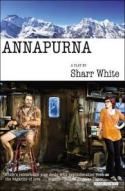 Annapurna was a relieving contrast to the last play. It is similarly contemporary and domestic (sorta), but it was so much better crafted and more enjoyable that I almost immediately lent my copy to a friend. That makes it a little harder to review in detail.
Annapurna was a relieving contrast to the last play. It is similarly contemporary and domestic (sorta), but it was so much better crafted and more enjoyable that I almost immediately lent my copy to a friend. That makes it a little harder to review in detail.

